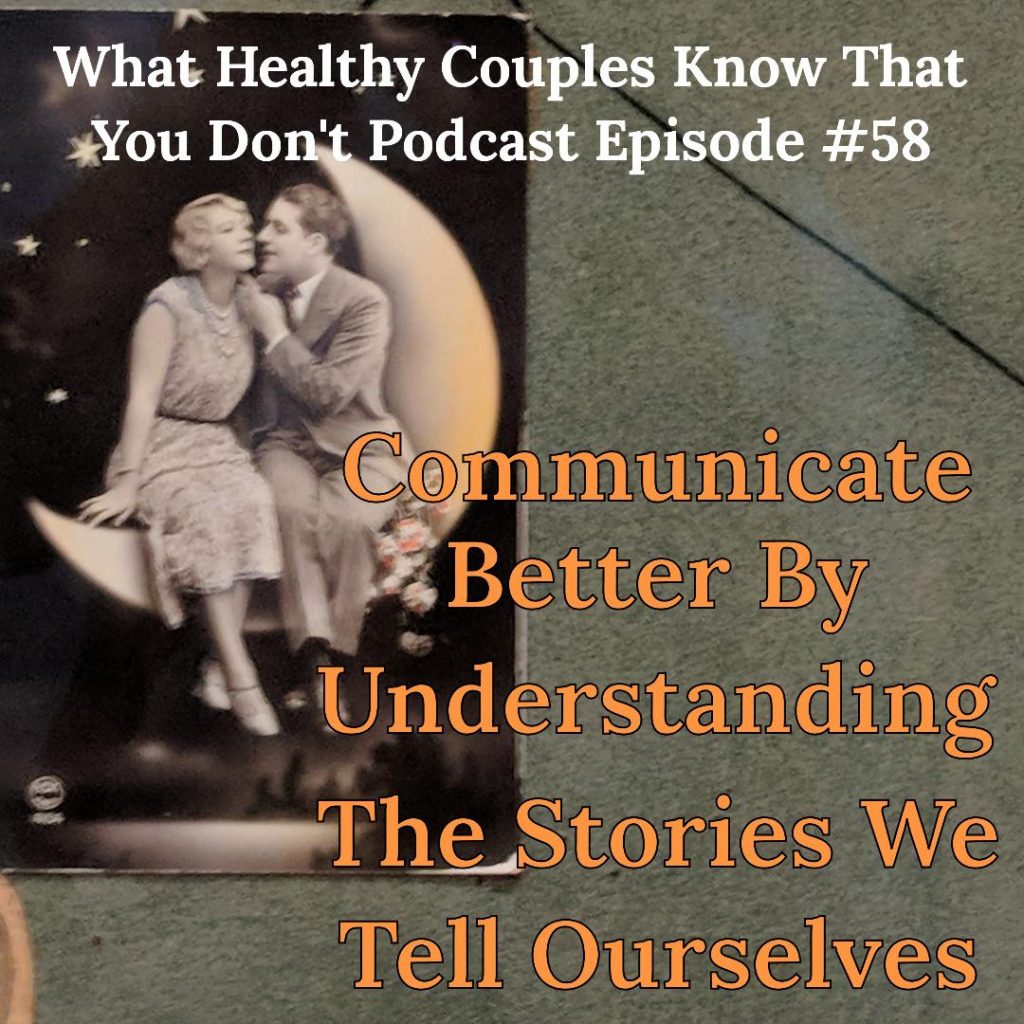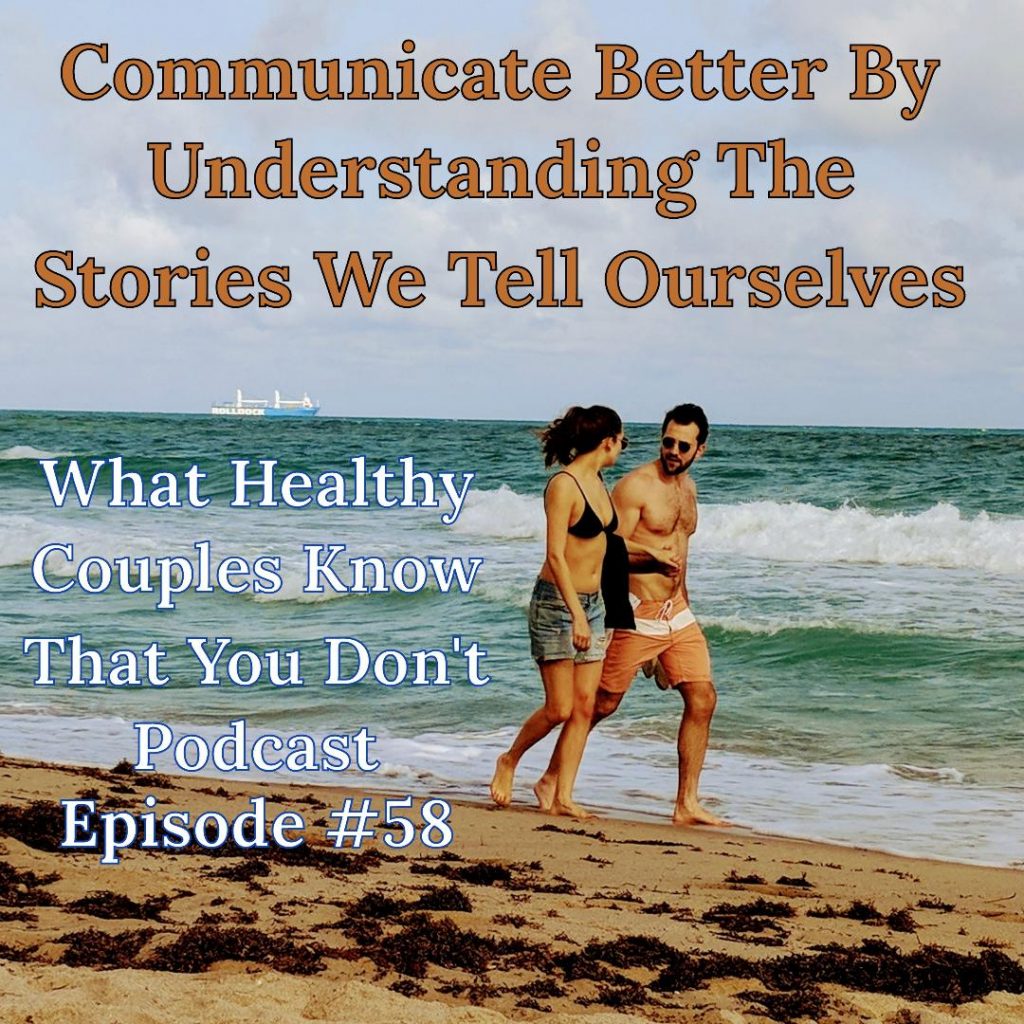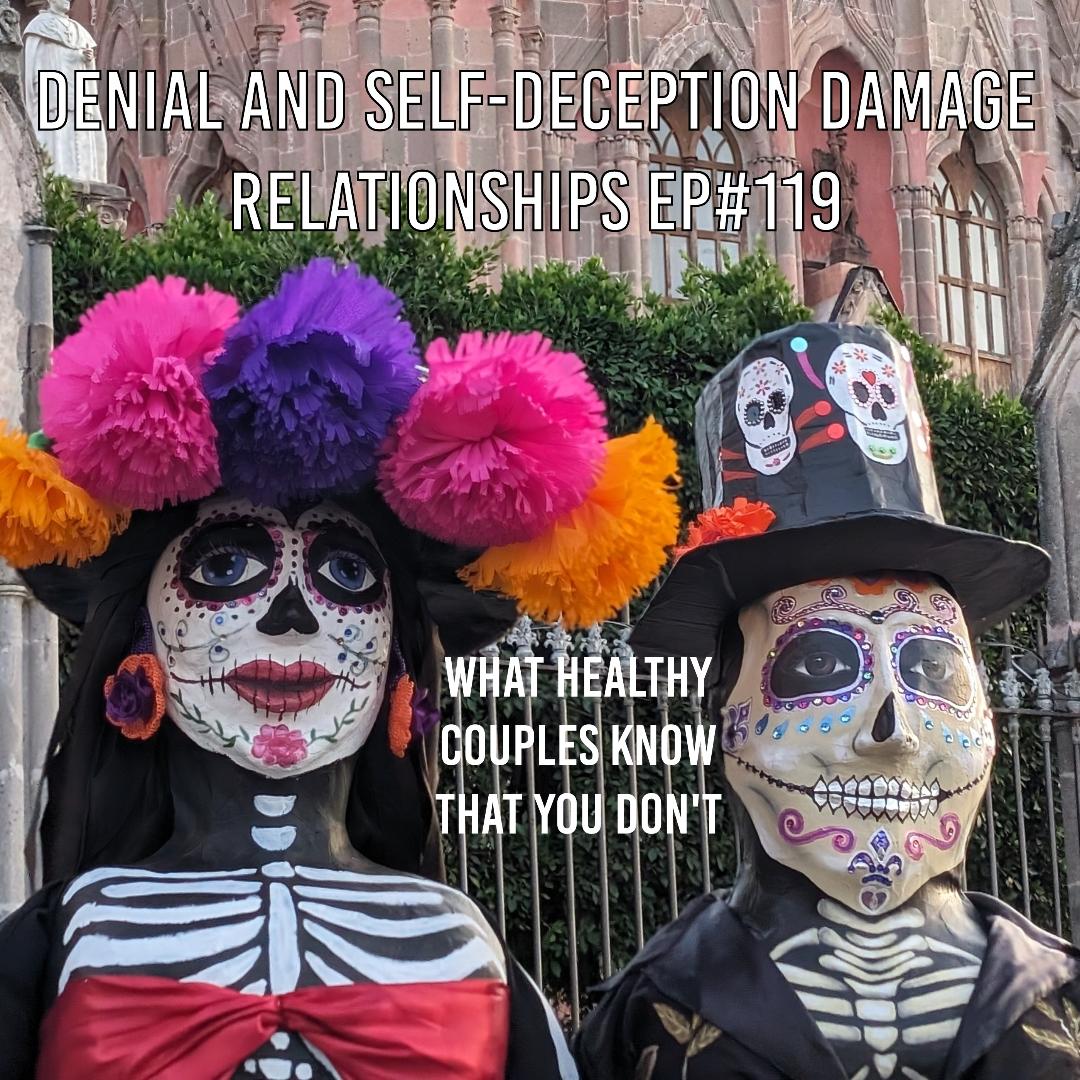Communicate better is something everybody wants for every relationship. Misunderstandings grow so easily without much effort. Listen to this episode to find out how to communicate better with your partner. Improvement begins by understanding the stories we tell ourselves that contaminate all of our interactions.

Share the Love & Spread the Word
PLEASE Tweet or SHARE on Facebook (sooooo helpful)
Subscribe on Apple Podcasts: HERE & please leave a review. THANKS!!!!!
PLEASE LISTEN ABOVE or Read Below:
Communication & The Stories We Tell Ourselves Episode #58
Communication problems are what everyone brings to couples therapy as their biggest problem. What makes communication so difficult? Why is it so hard to communicate better?
As a therapist one of the things I bring to couples is my ability to listen without defensiveness. I don’t have an agenda besides trying to understand each partners truths, respectfully collecting evidence. So for example I hear one partner use the word luxury as in “you have the luxury of being home with the kids when you used to help me at work.”
An ordinary reaction would be “I’m still helping you, don’t dismiss what I do.” Because I’m neutral and not defensive I can use my imagination and interrupt the parallel monologues going nowhere and offer up a new idea of what was said. “I think it might be that you don’t feel appreciated that work is harder for you without her help and that makes you feel resentful” and I check in to see if my imagination is accurate. I offer my evidence in the word luxury. He looks surprised because he hadn’t thought of being resentful and that what he might want is appreciation because it is harder for him now.
So communication gets in to trouble so fast and so early because there are emotions we don’t realize are even there in this case, resentment and a want wiggling around just out of our reach.
We communicate badly when we are unaware of our wants and emotions we get tied up in knots and get stuck in a story we tell ourselves. So his story might have been “Look at all I’ve done for her and she just doesn’t get how hard it’s been for me.” He then communicates this story that lands like an arrow shot into her heart and she has no idea how to make anything better.
Poking around and seeking out hidden truths is why I read detective novels set in other countries. I can relate to how hard it can be to go after real truths that lie hidden underneath the stories we tell ourselves.
Just like a cop show on TV when you watch the bad guy explain why it’s OK he didn’t tell the real story to begin with, he’s made up a story that makes it OK.
We all make up stories that make things OK that aren’t OK. On an earlier podcast episode I addressed this as having our own personal reality. We decide what to believe which leads to our poor ability to communicate. Just one example, “It wasn’t bad, we never had sex it was just an emotional affair.” The hard truth to face underneath that story is the damage done is about that special connection not being with your partner. We’re all excellent at making things that are not OK; OK.
This episode was inspired by my last interview with on anger management and Matthew said that he and his wife ask each other when they argue what’s the story you tell yourself which helps defuse the argument.
One of my Instagram posts (you can find me @rhodaoncouples) said have more imagination about your partner’s point of view. I have a lot of imagination for both people in my couples. I always check in with them to get it accurate which helps both people untangle themselves from the story they tell themselves into a deeper understanding of wants and emotions.
We all communicate badly when we are contaminated by the stories we tell ourselves which leads to parallell monologues instead of true dialogue. Communication gets unstuck when you can let two opposite things be true at the same time and let them sit quietly next to each other instead of trying to get one to win and erase the other.
So in the example we’ve been using today, his point of view, “I’ve been generous and paid a price for it by making things harder for me” needs to sit quietly next to her point of view; “I’ve really enjoyed being away from the business stress and things are so much better for me.”
One point of view does not have to be the only one that matters. That’s what makes parenting adolescents so difficult. They are determined that their truth is the only one that matters.
A lot of my work is balancing two truths and helping both people see the legitimacy of both truths. Juggling two truths makes communication complicated.
Which is exactly why I love the challenge of couples work, there is always more honesty available in the room when there are two people. Even when there is one person in the room steering their story exactly where they want it to go, I’m using my imagination to suggest other possibilities.
It is impossible to communicate with a partner if we only want to steer the story in our favor.

If we want to communicate better it requires an openness to the validity of someone else’s story even if you don’t like it.
People pleasers also contaminate communication. People pleasers get so lost in smiling and acting as if everything is OK. Their story will always be “I just want to make you happy.” Well, that’s just not honest.
Everybody has self-interest. People pleasers ignore what matters to them and then silently collect resentments over the years. They get to tell themselves “I’m the good one.” More honesty, an accurate picture that would improve communication would be “I’m good at care taking and I’m not honest enough about my own needs.”
My challenge for you today if you want to improve communication:
1. Examine the story you tell yourself and recognize the lopsidedness and unfairness that
screws up communication.
2. Try really hard to use your imagination about the other person’s point of view which may
distribute part of the problem back on you.
3. When you are self-righteous and indignant, stop and consider what might be your 15%,
20%, 25% or even 30% part of the problem.
4. Stop using win/lose, black/white 1/10 thinking and feeling when you communicate. Both
of you win, both of you lose, consider the gray in-between the black and white. The 4 5 6 7, the 1 & 10. When you communicate it’s complicated not simple because there are two of you.
5. Ask each other what’s the story you are telling yourself. Listen to it with curiosity not defensiveness.
6. You and your partner both listen to Brene Brown on YouTube 2 talks one 104/15 on Oprah and one 11/25/15. I wrote the script for this episode before I listened to Brene Brown on YouTube so no cross-contamination in what I offered today.













